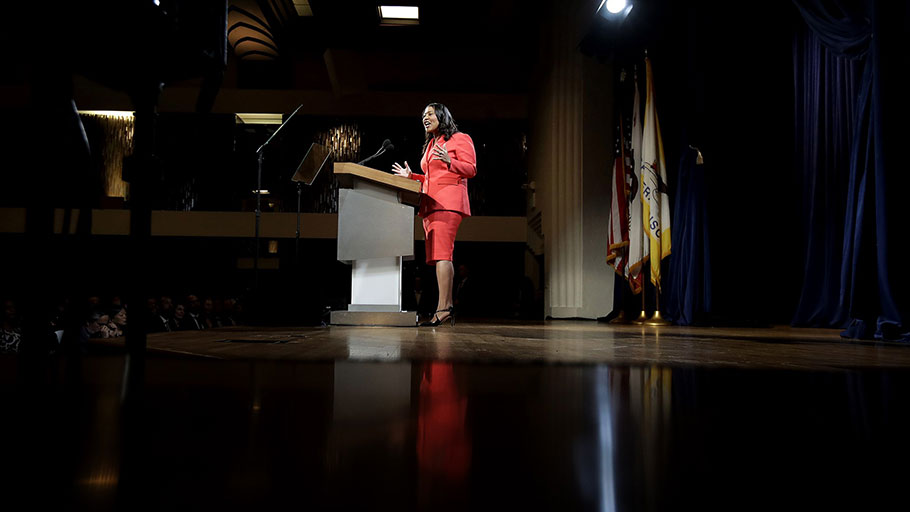San Francisco Mayor London Breed delivers the state of the city address on Jan. 30, 2019. Jeff Chiu, AP.
SAN FRANCISCO — After a bruising fight last year to become San Francisco’s mayor, London Breed faces token opposition on Tuesday’s ballot as she struggles to find solutions to the city’s homelessness crisis, drug epidemic and a housing shortfall that have put the politically liberal city in the national spotlight.
The former president of the Board of Supervisors and San Francisco native narrowly won a special June 2018 election to fill the seat left vacant by the sudden death of Mayor Ed Lee. She is the first African American woman elected as mayor of San Francisco, which has a population of 890,000.
She faces a daunting list of ills to fix.
While sprawling tent encampments are largely gone, homelessness surged 17% over two years, led by an increase in the number of people living in vehicles. The median sale price of a home is at least $1.4 million, and traffic remains a nightmare. Office workers zip by on sleek scooters while the impoverished sleep in doorways.
“There’s still a lot of anxiety,” said Corey Cook, a political science professor and a vice provost at Saint Mary’s College. “The city is in a deep conversation about whether and how to make San Francisco a vibrant, diverse, equitable, livable city.”
President Donald Trump dumped on San Francisco in September, accusing officials of allowing used needles and waste from homeless people to go through storm drains and into the Pacific Ocean. City officials denied the allegation.
Closer to home, opponents of a proposed homeless shelter along the city’s waterfront angrily shouted down the mayor at a heated hearing in April.
Breed said she gets their frustration.
“They were upset. They were concerned. They didn’t feel safe for various reasons, so I understand that,” the mayor said. “I also understand that as a city we have to address homelessness and these people aren’t just going to disappear.”
The mayor, who was raised by her grandmother in public housing, is striving to make a notoriously inequitable city into one where everyone has a shot at quality housing, great education and well-paying jobs.
“I want to see a better city, a better city where the investments and policy changes actually have a significant impact,” Breed, 45, said in an interview with The Associated Press.
She wants to build more units faster and in taller buildings and is frustrated by critics on the Board of Supervisors and elsewhere who see her position as a giveaway to market-rate developers.
Last year, Breed won by just over 2,500 votes out of more than 200,000 ballots cast.
The race was divisive, with critics painting Breed as the pick of the business and political establishment and her challengers, former state Sen. Mark Leno and then-Supervisor Jane Kim, as fresh faces capable of taking the city in a more politically liberal direction.
This time, Breed faces five little-known candidates without much money. Her closest competitor in fundraising is Ellen Lee Zhou, who has raised about $80,000 to Breed’s $600,000. Zhou faults Breed for not doing more to combat crime, help the homeless and clean up city streets.
But the lack of serious opposition suggests voters want to give her time, political experts say.
“While to some extent this is a reelection, she’s not really had much more than a year on the job, so you have to give her the space and the opportunity to try to address some of these issues,” Cook said.
Breed is campaigning for Proposition A, which would allow the city to sell $600 million in bonds for affordable housing. She also backs Proposition E, which would speed up the construction of housing on public land, especially for teachers, who are increasingly unable to live in the city in which they teach.
Like most of the city’s elected leaders, Breed opposes Proposition C, which was put on the ballot by electronic cigarette maker Juul Labs to overturn a citywide ban on all e-cigarette sales. San Francisco-based Juul Labs spent about $12 million supporting the measure before suspending the campaign in September.
Juul joins R.J. Reynolds and the soda beverage industry in spending heavily in recent years to overturn restrictions imposed by the health-conscious city.
Breed is also deeply invested in two other high-profile races where her appointees face serious opposition. In a race for a seat on the 11-member Board of Supervisors, her appointee Vallie Brown faces a challenge from tenant rights activist Dean Preston.
In the race for district attorney, her pick Suzy Loftus faces three contenders, including Chesa Boudin, a lawyer with the public defender’s office who is strongly opposed by the San Francisco police union.
Breed was accused of cronyism when she tapped Loftus to fill the remaining term of George Gascón, who resigned as district attorney three weeks before the November election, to run for office in Los Angeles.
The American Civil Liberties Union of Northern California accused Breed of undermining the democratic process.
Jon Golinger, a political strategist who ran Kim’s campaign for mayor last year, said it’s fair for Breed to get more time as mayor. But the winners of these two races may tip where voters are at when it comes to their mayor, he said.
“Are the voters selecting her for a full term and saying, ‘We want to give you the support to do the job?’ ” he said. “Or are they saying, ‘While we’re not going to kick you out, we do want a heavy counterweight?’”














